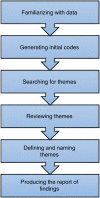'At least there is something in my bra': A qualitative study of women's experiences with oncoplastic breast surgery
- PMID: 35799478
- PMCID: PMC9544860
- DOI: 10.1111/jan.15309
'At least there is something in my bra': A qualitative study of women's experiences with oncoplastic breast surgery
Abstract
Aims: This study explores how women diagnosed with breast cancer may be supported by physicians and nurses during physical and existential changes related to oncoplastic breast surgery in Denmark. The following research questions were addressed: (a) how do women experience oncoplastic breast surgery, and (b) how does cancer treatment affect their body image?
Design: A descriptive qualitative study design with a six-step thematic analysis influenced by Braun and Clarke was applied in this study. This paper has been prepared in accordance with the consolidated criteria for reporting qualitative research.
Methods: Fourteen in-depth interviews with seven women diagnosed with breast cancer were conducted from August 2018 to March 2019. In this qualitative study, data analysis was performed concurrent with data construction, recognizing that the process of analysis and making sense of data should start during the interviews. We explicitly frame the discussion of the findings in a theory of embodiment influenced by Merleau-Ponty, consistent with the construct of exploring human experiences to generate meaningful knowledge for applied practice.
Results: Two overall themes with related subthemes were identified: (1) 'Treatment is required for life-threatening cancer', and (2) 'Striving for a new normal body'. Across both themes, women's experiences reflected a 'time pendulum' as they contemplated their past identity, their current rationale and their transition to a future beyond breast cancer with a changed body.
Conclusion: Participants reflected on their past, present and future when facing an altered body image caused by their breast cancer diagnosis and oncoplastic breast surgery. The participants in the study expressed broad levels of satisfaction with the results of the oncoplastic breast surgery. The reconstructed breast helped them to live normally again, in particular maintaining interpersonal relationships. Breast reconstruction supported participants' embodiment experiences and redefinition of their 'new normal'.
Impact: This study showed the dynamic changes in self-definition from receiving a breast cancer diagnosis and cancer treatment to oncoplastic breast surgery. The main finding of self-redefinition was from the perspective of breast cancer women who were in a period of transition between post-diagnosis and consultation for oncoplastic breast surgery. The findings indicate that advanced nurse specialists in the field of oncoplastic breast surgery can enhance psychosocial wellbeing and support women pre- and post-operatively by focusing on patient experiences of self-image and embodiment.
Keywords: advanced nursing; breast cancer; longitudinal research; oncoplastic breast surgery; recovery; supportive care needs.
© 2022 The Authors. Journal of Advanced Nursing published by John Wiley & Sons Ltd.
Conflict of interest statement
The authors declare that there is no conflict of interest.
Figures
Similar articles
-
"I just have to move on": Women's coping experiences and reflections following their first year after primary breast cancer surgery.Eur J Oncol Nurs. 2016 Apr;21:205-11. doi: 10.1016/j.ejon.2015.10.005. Epub 2015 Oct 29. Eur J Oncol Nurs. 2016. PMID: 26521054
-
Women's experiences with breast cancer during diagnosis and therapy, Wolaita, Ethiopia: a qualitative study.BMC Womens Health. 2024 Mar 13;24(1):176. doi: 10.1186/s12905-024-03016-z. BMC Womens Health. 2024. PMID: 38481324 Free PMC article.
-
The value of patient-reported experience in oncoplastic breast conservation following standardized assessment and shared-decision making. A qualitative study.Eur J Surg Oncol. 2024 Oct;50(10):108524. doi: 10.1016/j.ejso.2024.108524. Epub 2024 Jul 1. Eur J Surg Oncol. 2024. PMID: 39067305
-
How Can We Improve Education of Breast Surgeons Across Europe?Chirurgia (Bucur). 2017 Jul-Aug;112(4):365-366. doi: 10.21614/chirurgia.112.4.365. Chirurgia (Bucur). 2017. PMID: 28862111 Review.
-
Body image experience of women with breast cancer: A meta-synthesis.Scand J Caring Sci. 2023 Mar;37(1):20-36. doi: 10.1111/scs.13102. Epub 2022 Jul 4. Scand J Caring Sci. 2023. PMID: 35781312 Review.
Cited by
-
Demographic and clinical impact on preoperative BREAST-Q ePROM completion and baseline outcomes in women undergoing breast cancer surgery: a quantitative descriptive study at a Danish university hospital.BMJ Open. 2025 Jan 2;15(1):e091122. doi: 10.1136/bmjopen-2024-091122. BMJ Open. 2025. PMID: 39753265 Free PMC article.
-
Assessing the Content and Effect of Web-Based Decision Aids for Postmastectomy Breast Reconstruction: Systematic Review and Meta-Analysis of Randomized Controlled Trials.J Med Internet Res. 2024 May 27;26:e53872. doi: 10.2196/53872. J Med Internet Res. 2024. PMID: 38801766 Free PMC article.
References
-
- Atisha, D. M. , Rushing, C. N. , Samsa, G. P. , Locklear, T. D. , Cox, C. E. , Shelley Hwang, E. , Zenn, M. R. , Pusic, A. L. , & Abernethy, A. P. (2015). A National Snapshot of satisfaction with breast cancer procedures. Annals of Surgical Oncology, 22(2), 361–369. 10.1245/s10434-014-4246-9 - DOI - PubMed
MeSH terms
LinkOut - more resources
Full Text Sources
Medical
Miscellaneous



